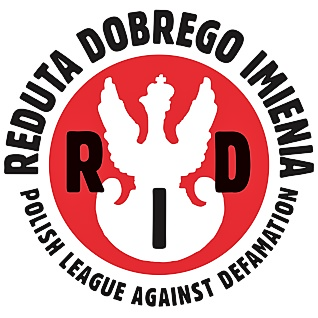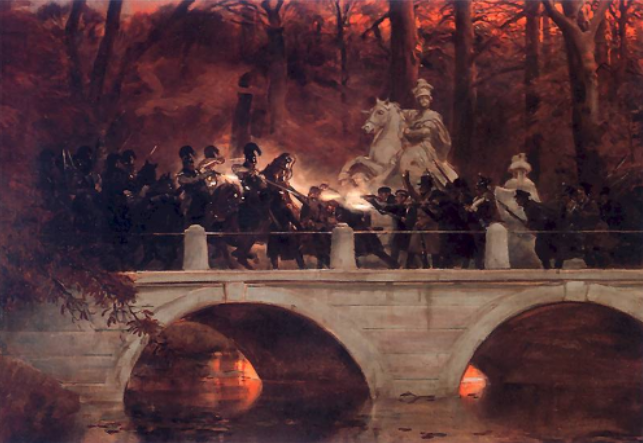At the end of the 18th century. Republic lost its freedom, sovereignty and independence. The reason for this state of affairs was primarily the weakness of the state, which was worked for by a great many, starting with the last Polish kings. The worst records in our history were written by such rulers as August II the Strong, August III but also Stanislaw August Poniatowski and numerous deputies of bribed magnates and nobles.
Although Polish patriots made attempts to reform the country, the changes they prepared were never put into practice. Thus, the three partitioning states – the military and economic powers of the time – Austria-Hungary, Prussia and Russia divided Polish territory between them.
The loss of independence hurt many enlightened and decent people, born and raised in the country on the Vistula River. These personalities never lost faith and tried to fight for the freedom of their homeland. During the period of partition, this was done, among others, by the „hero of two nations,” namely Tadeusz Kosciuszko. Then the Poles, led by Prince Joseph Poniatowski, fought side by side with the „Emperor of the French” Napoleon Bonaparte and won for themselves the so-called Duchy of Warsaw. Ultimately, Napoleon lost and with him the dreams of Polish freedom were buried. At the same time, in 1815, the Duchy of Warsaw was turned into the Kingdom of Poland a.k.a. the Congress Kingdom, completely dependent on Czarist Russia.
Meanwhile, in the following years, under the rule of the partitioners, the situation of Polish society, although many at the time had no idea that they belonged to such a collective, gradually deteriorated. By far the worst conditions prevailed in areas ruled by the Prussians and the Russians, and decidedly better under the Emperor of Austria-Hungary.
In the Kingdom of Poland, individual tsars violated the provisions of the Constitution, introduced in 1815. Constitution. They began by abolishing freedom of the press and introducing censorship. Then they banned freedom of assembly and struck at Polish patriotic associations and organizations, including the Patriotic Society. It should come as no surprise, then, that Poles’ anger at the activities of the Russian authorities gradually grew. Its manifestation was the establishment, in 1928, of a secret organization known as the Wysocki Conspiracy.
The above-described association was formed at the Officer Cadet School in Warsaw, around Polish officer Piotr Wysocki. The formation of the Conspiracy was the result of the activities of the so-called Sejm Court, the chief judicial body of the Kingdom of Poland, which in 1827 considered the case of the Patriotic Society just mentioned. Although the Sejm court handed down rather lenient sentences, largely under the influence of public opinion, the activities of this body had quite an impact on the development of events in Poland, if only through the formation of Wysocki’s Conspiracy, which took as its main goal the restoration of Poland’s independence. This was to be accomplished through an armed uprising. Significantly, however, Wysocki’s men first planned to force the then Russian Czar Nicholas I to return to the civil liberties taken away from Poles in recent years. This idea never came to fruition, making it decided to turn the thought of an insurrection into action.
The right time for the insurgents, in Wysocki’s view of course, came in the late autumn of 1830. By then, the Poles were already feeling the Russian terror quite painfully. In addition, revolutionary movements had unleashed riots in Belgium and France. These latter events prompted Nicholas I to take appropriate steps. This is because he recognized that the Western revolts just mentioned contradicted the arrangements of the Congress of Vienna, which had introduced the so-called „New Deal” to Europe, just after the end of the Napoleonic wars.
The Russian leader decided to mobilize both his armies and the forces of the Kingdom of Poland, commanded by his brother, Grand Duke Constantine Romanov, who was hated by the Polish officer cadre. These armies were to move westward, if necessary, to smash the rebellious French and Belgians.
This decision fundamentally affected Wysocki’s plans. It determined that the uprising should begin immediately. This is because the conspirators feared two things. First of all, they did not want to fight alongside the Russians against the Belgians and French. Secondly, they suspected that the tsar intended to introduce his troops into the Kingdom of Poland, which would immediately pacify any resistance. In addition, the conspirators guessed that the tsarist police had already fallen on the Conspiracy’s trail, resulting in imminent arrests.
Thus, the High decided to begin military action on November 29, at 6 p.m. The Conspiracy leader described the beginning of the insurrection as follows: „At six o’clock the sign was given for the simultaneous commencement of all hostilities by lighting the brewery on Solec in the vicinity of the Russian cavalry barracks. Polish troops moved from the barracks to the indicated positions. I rushed to the cadet barracks. In the cadet lounge a tactics lesson was being held at the time. Having run into the room, I called out to the brave youth: „Poles! The hour of revenge has come. Today you must die or win! Let us go, and let your breasts be Thermopylae for your enemies!”. At this speech and a thundering voice from afar: „To arms! To arms!”, the youth snatched up their rifles, loaded them and with a rush of lightning jumped after the commander. There were a hundred and sixty-some of us!”. Thus began a night that has gone down in history under the term „November night.”
Fighting for the Polish capital began to gradually spread over the city. Nevertheless, the conspirators did not achieve all their goals. First of all, the Grand Duke Konstantin did not fall into their hands. In addition, some officers of the Polish Army refused to take part in the fighting, and some wealthy residents of the capital, hearing the shouts urging them to fight, closed the gates and shutters of their tenements and houses. Despite these difficulties, ordinary soldiers and residents of Warsaw joined the battle. For example, they managed to capture the Arsenal, which determined the successful start of the uprising.
In a word, on November 30, 1830, the Polish capital was free. Despite this, problems began to grow with each passing hour. The most important dilemma was whether to go to open war with Russia or to seek some compromise with her. In addition, the so-called Administrative Council – the executive body of the Kingdom of Poland – came out against the insurgents, ordering its subordinate troops to disarm the „rebels.” The Council did not believe in the effectiveness of the uprising and wanted a settlement with Grand Duke Konstanty.
Eventually, the Administrative Council was dissolved. It was replaced by the Provisional Government, led by Prince Adam Jerzy Czartoryski, who appointed General Józef Chłopicki as Commander-in-Chief of the Polish Army. This decision was one of a great many bad ones made by the people who influenced the fate of the November insurrection. Chłopicki, like many of his ilk, did not believe in the success of the uprising. Thus, he was instrumental in its downfall, which came after many heroic battles and bloody events almost a year later, i.e. in October 1831.

